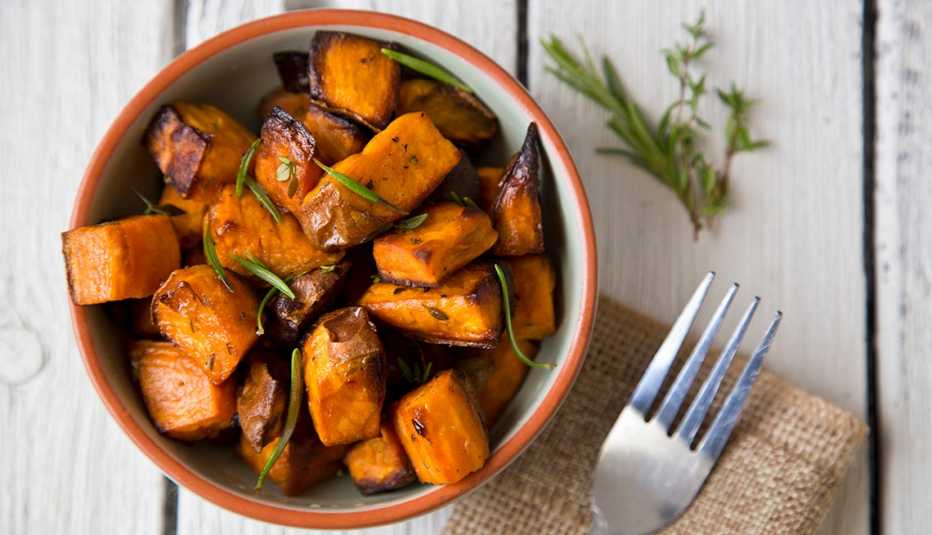6. Salmon
It’s not plant-based, but this fish is one of the few foods that provides vitamin D, which plays a huge role in regulating your immune system, says Jennifer McDaniel, owner of McDaniel Nutrition Therapy in Clayton, Missouri.
A 2020 study published in the journal JAMA Network Open found that people who had untreated vitamin D deficiency were almost twice as likely to test positive for the coronavirus as patients who had sufficient levels of the vitamin.
A 6-ounce salmon filet has about 600 international units of vitamin D, which is close to the 800 IU that is recommended daily for people 70 and older. Another bonus: It’s rich in omega-3 fatty acids, which have also been shown to strengthen your immune system.
If you’re not a fan of fish, McDaniel suggests marinating it in brown sugar and Dijon mustard for 45 minutes, then throwing it on the grill. “It mellows out that fishy taste, and it gives it a smoky flavor,” she says.
Canned salmon counts too. Throw it over a salad for a quick meal, McDaniel says.
7. Garlic
It’s rich with a compound called alliin, which may be the source of its immune-boosting properties, says Libby Mills, a Philadelphia nutritionist and former spokesperson for the Academy of Nutrition and Dietetics.
A 2020 review published in the journal Medical Hypotheses found that garlic seems to stimulate cells related to immune system function. Another study, published in The Journal of Nutrition, found that people given about 2½ grams of aged garlic extract for 90 days not only had higher levels of immune system cells but also had fewer symptoms of cold and flu. They also missed fewer workdays because of these respiratory illnesses, compared with a control group.
At the very least, if you eat enough of it, you’ll probably keep people away from you, Mills jokes.
Although there’s probably not enough research to support taking a garlic supplement, Mills recommends cooking with it in the winter months. You can make your own pasta sauce with tomatoes and garlic, and the former’s vitamin C is itself an antioxidant that helps the immune system, she says.
8. Kefir
Recent research, including a 2021 study published in Biomedicine & Pharmacotherapy, suggests that certain compounds found in fermented dairy products, such as kefir (which is like a thin yogurt), have anti-inflammatory properties that can help the immune system fight viral infections.
The probiotics found in kefir and other fermented foods also help to calm chronic inflammation, according to Harvard Health. “Fermented dairy is rich in probiotics, which seem to have a positive effect on the immune system,” Mills says.
9. Curcumin
Curcumin is a polyphenol in the turmeric plant that gives the spice its signature orange-yellow tint and is known for its anti-inflammatory and antiviral effects.
In recent years, it’s been the subject of some studies on flu and COVID-19. Most of the studies have been in lab dishes, and large clinical studies in humans are lacking, says Julie Stefanski, a registered dietitian nutritionist and spokesperson for the Academy of Nutrition and Dietetics.
A 2024 study in Virology Journal found that a nasal film spray with curcumin can ease flu severity and enhance production of antimicrobial peptides known to stop the flu. Also, the anti-inflammatory cytokines (proteins that can control inflammation) mean curcumin may reduce inflammatory injuries from the virus.
Curcumin may help with cold-like symptoms, which can accompany the flu. In a 2023 study in the Journal of Dietary Supplements, 65 participants took 150 milligrams a day of highly bioavailable curcumin, while 30 participants got a placebo. People on the supplement who got colds had fewer days with symptoms, compared with those on the placebo.
“The amounts of turmeric or curcumin that may be beneficial while healthy or ill have not been determined yet,” Stefanski says.
People should be careful about taking supplements, especially when they are sick, because some supplements could interact with your medications or cause problems if you have an underlying health condition.
Editor’s note: This story, published Nov. 1, 2021, has been updated to reflect new information.



































































)
)















More From AARP
11 Foods and Drinks High in Polyphenols
Here's why you need more of this nutritional powerhouse
10 Ways to Avoid Getting the Flu
Common-sense things to do to avoid infection.
Smart Guide to Vaccines for Adults Over 50
A comprehensive guide to vaccines and their benefits